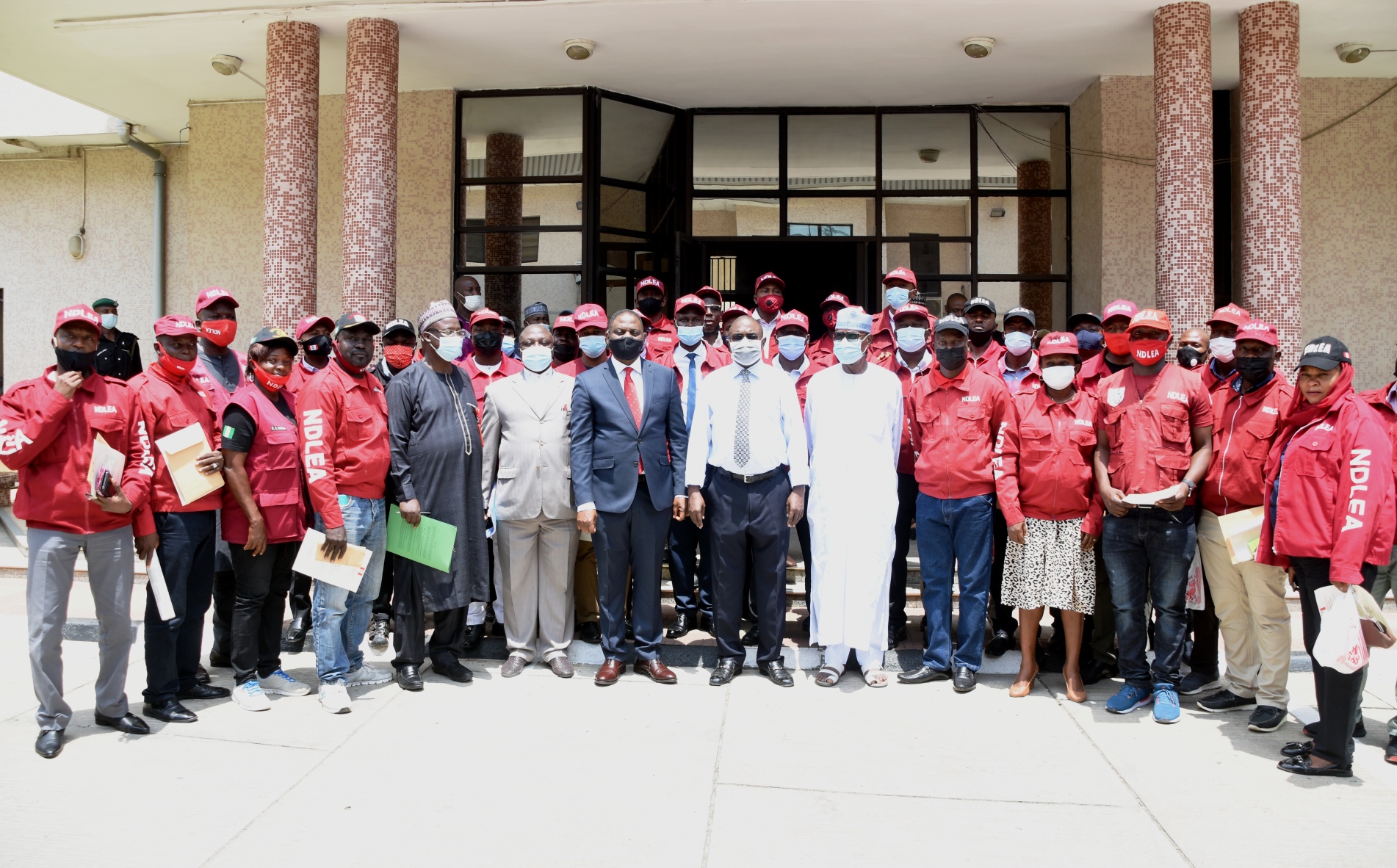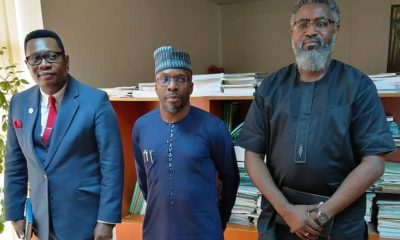Editorial
Saving Nigeria From Drug Addiction

The gravely worrisome state of insecurity and general social upheaval currently rocking the country can be said to be the manifestation of a number of factors including dire economic circumstances, unwholesome politicking and perennial leadership failure. Brig Gen. Buba Marwa (rtd), Chairman and Chief Executive Officer of the National Drug Law Enforcement Agency (NDLEA), recently pointed out another critical driver of the social and economic malaise in Nigeria-widespread abuse of drugs and narcotic substances.
Speaking at the occasion of his coronation as the Aare Jaqunmolu of Ogidi Kingdom during the 2021 Ogidi Day celebration in Ijumu Local Government Area of Kogi State recently, Gen. Marwa expressed deep concern about the trend of drug abuse in the society, disclosing that at least 10.6 million of Nigeria’s population were addicted to the consumption of cannabis or Indian hemp alone.
“Today, no fewer than 14.3 million Nigerians, young people and adults from the age of 16 to 64 years abuse drugs, with cannabis being the commonly abused substance. At least 10.6 million people are addicted to cannabis in the past year.
“What is heartbreaking is that majority of them are young people who are initiated into cannabis’ use around the age of 19. There is also increasing use of other psychotropic drugs, especially heroine, again, by a growing number of young people who are mostly initiated at the age of 22.
“The more you unravel the statistics of drug uses in Nigeria, the more damning it becomes. And when you combine these damning data with the recent results of the activities of the NDLEA, then you begin to get worried,” he said.
The NDLEA boss who noted that the use of illicit drugs has destroyed many families, ruined lives of many young people, urged parents and guardians to take proper care of their children and wards while asking for concerted efforts of all Nigerians to curtail the raging fire.
It is, to say the least, alarming that as much as 5% of Nigeria’s population, who are in the most productive age bracket, are hooked on to the deliberate ingestion of substances which result in their physical, mental, emotional or social impairment. Some substances are said to be capable of altering the mind, changing the user’s feeling, perception and behaviour because they exert action on the brain.
The abuse of drugs including alcohol deadens the nervous system, increases heart-beat, causes the blood vessels to dilate, causes digestion difficulties, interferes with the power of judgement and poisons the higher brain and nerve centre, produces blurred speech, staggering, sluggishness, reaction, erratic emotionality, untimely sleep, elevating mood, suppresses hunger, decreases fatigue, causes sensation and sensory hallucination. Furthermore, the use and abuse of hard drugs also cause reduction in physical and psychological sensitivity that occasion loss of contact with reality, sense of euphoria, reduces fear, induces tension and anxiety, causes unconsciousness, coma and death.
Aside the related health consequences, drug dependence and abuse also cause social dislocation, personality disorder and exerts constant financial pressure on the indulgent and their support systems. Also seriously impacted is the healthcare system of the communities, local governments, states and the federal government. No doubt, abuse of substances has always been closely linked to the surge and ferocity of cultism, armed robbery, rape, banditry, kidnapping and sundry violent crimes that have increasingly infested our country.
To contain the social and economic scourge of drug dependence and abuse, the NDLEA must be accorded all the cooperation, support and assistance needed to function optimally. It is heartwarming that the agency is reported to “have arrested more than 2,180 drug traffickers, intercepted and seized over two million kilograms of assorted illicit substances such as cocaine, heroin, methamphetamine, tramadol and cannabis”.
According to the chief drug law enforcement officer, “Broadly speaking, the agency has been able to seize drugs and cash worth over N90 billion within the first four months of this year. We have filed over 2,000 drug cases in court. Over 500 have been sentenced and are serving different jail terms. And we still have over 1,500 of the cases pending in court”.
Impressive as the performance of the NDLEA has been, especially since Gen. Buba Marwa assumed leadership of the agency, The Tide believes that the outfit alone cannot win the war against narcotic substances without the buy-in and active participation of all Nigerians. Accordingly, apart from governmental support and assistances at all levels, we think that an active and robust involvement of the traditional institution, religious organisations, educational institutions, youth groups, civil society groups, town unions is key.
Proper parental nurturing, guidance, monitoring, counseling and mentoring are as well critical to controlling the menace. Parents should be able to give account of the lifestyles of their children and wards and take serious interest in their physical, psychological, emotional and mental well being.
The NDLEA must be further strengthened in all ramifications to be more aggressive, effective and efficient in bursting the sources, routes and syndicates involved in the production, trafficking, distribution and consumption of hard drugs. This should include the locating and destruction of cannabis farms anywhere in the country.
Campaigns against drug abuse need to be given more impetus and taken to all the nooks and crannies of the country, especially the rural areas. Stiffer penalties for drug offenders should be applied while the Federal Government should consider the setting up of dedicated courts to try drug-related matters for quicker resolution of cases.
The Tide believes that it will do the fight against illicit drugs a world of good if a scheme is initiated to encourage and reward-whistle blowers while no attention should be paid to the proposition of Governor Rotimi Akeredolu regarding the production and use of cannabis. To say the least, the proposal of the governor that the hard drug be legalized is ill-advised, ill-conceived and capable of worsening an already bad situation.
For an overall and sustainable success to be achieved, efforts must be made to improve on the depressing economic circumstances in the country. Youths must be productively engaged to take their minds away from unproductive ventures like crimes and other destructive pastimes.
From all intents and purposes, the battle against illicit drugs use, abuse and addiction, is a fight for a safe peaceful, healthy, productive and prosperous society and secure future for our youths that must be won.
Editorial
Resurgence Of Illegal Structures In PH
Editorial
Certificate Forgery, Loss Of Public Trust

Editorial
In Support of Ogoni 9 Pardon

-

 News5 days ago
News5 days agoJAMB Conducts CBT Promotion Exams For 6,000 Directors
-
Sports4 days ago
Hoopers Ready For NPBL Title Defence – Captain
-
Politics4 days ago
Eno Sacks Aides Who Attended PDP Convention
-
News4 days ago
Rivers Community Marks Annual Wrestling Festival
-

 Business4 days ago
Business4 days agoNigeria’s Inflation Rate Eases To 16.05% – NBS
-

 News10 hours ago
News10 hours agoRSG Woos Investors As PHCCIMA Unveils Port Harcourt Int’l Trade Fair
-

 News5 days ago
News5 days agoNSCDC Arrests 20 Suspects For Alleged Threat To National Security
-
Health4 days ago
Police Hospital Reports More Malaria Incidence

